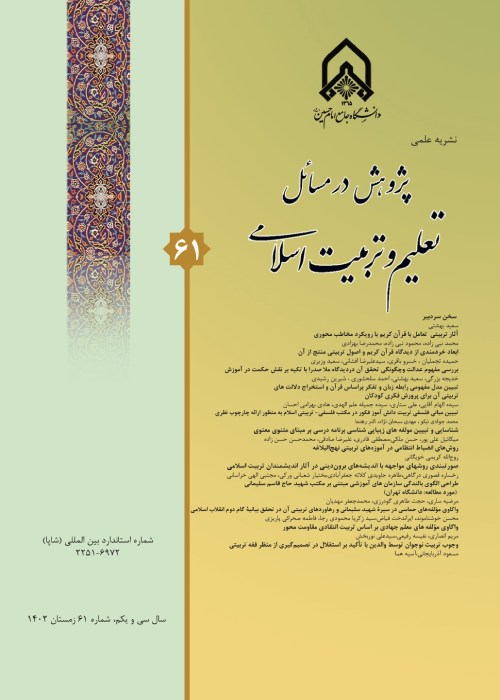Epistemology from Imam Ali's Point of View, Emphasizing on Educational Implications
Author(s):
Article Type:
Research/Original Article (دارای رتبه معتبر)
Abstract:
The purpose of this study is to investigate epistemology from Imam Ali's (AS) point of view, with an emphasis on its educational implications in terms of levels, resources, instruments, obstacles and consequences of knowledge. It also aims at identifying the causal and intermediate provisions and strategies for acquiring knowledge from Imam Ali's (AS) point of view and explaining its educational implications. To achieve these goals, eight questions were raised. This research follows grounded theory method and its content is derived from the gracious books of Nahj al-Balaghah, Ghurar al-Hekam, and other Shiite narrative sources containing the sayings of Imam Ali (AS). The results of the research demonstrated that the causal provision for obtaining knowledge is "divine guidance", and its mediating provision is "divine piety". The levels of knowledge include "doubt, suspicion and certainty"; sources of knowledge contain "revelation and inspiration, reason, the heart, Fitrah, verses of nature, verses of the soul, (human being) and history". The instruments for acquiring knowledge include: "contemplation in the Holy Qur'an, wisdom (reasoning / thinking), sense, discovery and intuition, and taking lessons from the lives of the Ahl al-Bayt (AS). Furthermore, barriers to knowledge include: "following the temptations of the soul, worldliness, non-divine love, lust, longing, obedience to the wicked things and associating with them, excessive improper jokes, egoism and selfishness, sedition, greed, poverty, evil temptations, anger, controversy, neglecting knowledge, pride, short-sightedness and doubt". The consequences of knowledge include: distinction between righteousness and void, possession of the advantage of Shahid, acquiring faith, maintaining faith, piety, acquiring excellence, acquiring intuition, theology and forgiveness". The strategies for the development of knowledge include: "sincerity, self-sacrifice, expedition in the verses of nature and spiritual verses (self-cognition), remembrance and reminiscence of God, self-purification, and experience." The findings of the research also indicated that appropriate educational implications of epistemology from Imam Ali's (AS) point of view in terms of educational goals includes "closeness to God" as an ideal goal, four general goals, and a number of peripheral-goals, as well as appropriate educational methods and issues.
Keywords:
Language:
Persian
Published:
Scientific Journal of Islamic Education, Volume:28 Issue: 46, 2020
Pages:
5 to 30
https://magiran.com/p2149823
دانلود و مطالعه متن این مقاله با یکی از روشهای زیر امکان پذیر است:
اشتراک شخصی
با عضویت و پرداخت آنلاین حق اشتراک یکساله به مبلغ 1,390,000ريال میتوانید 70 عنوان مطلب دانلود کنید!
اشتراک سازمانی
به کتابخانه دانشگاه یا محل کار خود پیشنهاد کنید تا اشتراک سازمانی این پایگاه را برای دسترسی نامحدود همه کاربران به متن مطالب تهیه نمایند!
توجه!
- حق عضویت دریافتی صرف حمایت از نشریات عضو و نگهداری، تکمیل و توسعه مگیران میشود.
- پرداخت حق اشتراک و دانلود مقالات اجازه بازنشر آن در سایر رسانههای چاپی و دیجیتال را به کاربر نمیدهد.
In order to view content subscription is required
Personal subscription
Subscribe magiran.com for 70 € euros via PayPal and download 70 articles during a year.
Organization subscription
Please contact us to subscribe your university or library for unlimited access!


